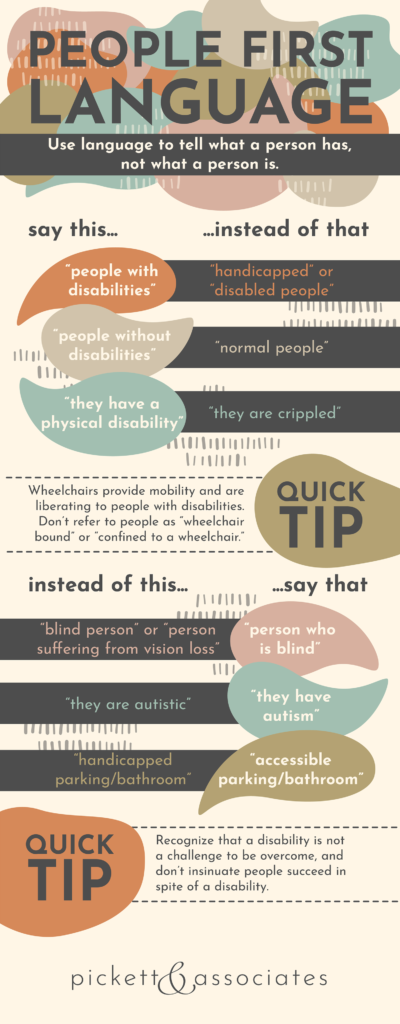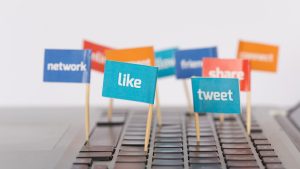Why do words matter? It’s about putting people first.
A note from Pat: When I was six, I had scoliosis. The treatment: a “Milwaukee brace” (that’s what the girl wore in “16 Candles” who couldn’t quite drink from the drinking fountain … or as seen in “Romi & Michelle”) and physical therapy at “Crossroads Rehabilitation Center” aka, now known as Easterseals Crossroads. While this was more of a minor inconvenience in light of the serious challenges some kids conquer, it did open my eyes to something significant. At that time (back in the dark ages), there wasn’t such a thing as the “ADA” or accommodations. In my hometown (Indianapolis), there was one school to which all the students who had any sort of physical, emotional or intellectual disability were funneled. I know. Let it sink it. It was suggested I’d be “better off” at this school when my mom asked for a special desk so i could read without holding a book above my head. I’ll spare you the details of “the day my mama socked it to … ,” but suffice it to say, that didn’t occur. That said, it made me painfully aware of all those kids who WERE there. And labeled as so very different. Fast forward light years, I get to work with Easterseals as a client early in my PR career, and learn about “People First Language.” And jump another decade, and the hubs is deeply involved with Special Olympics Indiana. And they, too, encourage “People First Language.”
physical therapy at “Crossroads Rehabilitation Center” aka, now known as Easterseals Crossroads. While this was more of a minor inconvenience in light of the serious challenges some kids conquer, it did open my eyes to something significant. At that time (back in the dark ages), there wasn’t such a thing as the “ADA” or accommodations. In my hometown (Indianapolis), there was one school to which all the students who had any sort of physical, emotional or intellectual disability were funneled. I know. Let it sink it. It was suggested I’d be “better off” at this school when my mom asked for a special desk so i could read without holding a book above my head. I’ll spare you the details of “the day my mama socked it to … ,” but suffice it to say, that didn’t occur. That said, it made me painfully aware of all those kids who WERE there. And labeled as so very different. Fast forward light years, I get to work with Easterseals as a client early in my PR career, and learn about “People First Language.” And jump another decade, and the hubs is deeply involved with Special Olympics Indiana. And they, too, encourage “People First Language.”
I wanted to take the opportunity this spring — this spring as we emerge from a global pandemic and are eyes might be a little more open to social justice — to remind everyone why People First Language is important. It’s not a “politically correct” thing. It’s ensuring inclusion of all, without labels that put appearance, mobility, intellect, any physical attribute before the fact they are an equal human in this world. We’ve created a little diagram that perhaps is helpful and some explanation below. If I never need to write another note to a reporter or editor again about why they shouldn’t have a headline, “Handicapped Students Participate in Blah-Blah,” my work is done.
We have written a lot on the P&A blog about marketing trends and what they mean for all types of businesses. Now that 2021 is upon us, we can’t help but see another trend taking shape: People First Language. Have you noticed that the importance of words is being taken into consideration now more than ever? With a movement toward equity for marginalized peoples gaining momentum, it is up to trend setters and businesses to jump into a more forward-thinking state of mind.
One marginalized group that suffers from identity-first language is people with both physical and mental differences or illnesses. The Employer Assistance and Resource Network on Disability Inclusion (EARN) states that, “Rather than defining people primarily by their disability, people-first language conveys respect by emphasizing the fact that people with disabilities are first and foremost just that—people.” In other words, we need to stop using someone’s disability to define them in conversations or workplace environments.
An example of identity-first language would be calling someone handicapped. Many of us grew up using or hearing this word, along with others like retarded, mentally disabled, deaf and dumb, wheelchair bound, stricken, crippled … you get the picture. Instead of labeling someone based on what afflicts them, recognize with language that they are a person first and foremost. Use language like person with a disability, person who is deaf, person with epilepsy. Literally putting the person first makes much more sense. We don’t walk around saying blonde hair person, but rather a person with blonde hair.
We know this may have you wondering what wording you are supposed to use in the many situations you are likely to encounter, and it can be tricky and difficult to know exactly what to say sometimes. In order to help everyone in a business situation or social media post feel included and respected, you may just have to ask difficult questions. In fact, since there are no hard and fast rules regarding how we are to refer to each other, the most logical solution may be to simply ask. If asking a person how they would like to be spoken of isn’t possible, the logical next step would be to consult the community of marginalized peoples in order to find how the majority feels about a specific piece of language.
Yes, this will take work and, yes, it will also take time. In our world today we are used to things being streamlined and automated. Perhaps the fact that language is forcing us to stop and re-connect on a personal level means that we are all meant to slow down and notice one another as living and breathing human beings. Automation can make us all feel like machines, when, in fact, we are all people who just want to be seen and understood. People with disabilities are no different.





